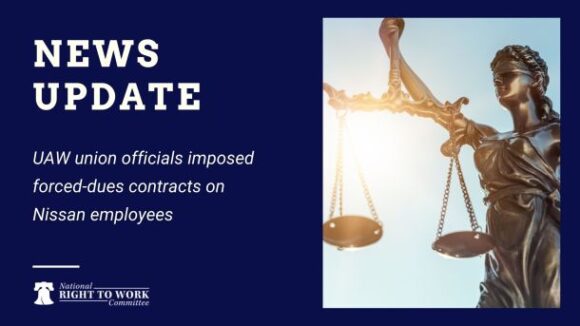‘People Have a Right to Make Their Own Choice’
Avelo employee Kim Howard believes all the firm’s flight attendants should get to vote on continued AFA rule. Credit: WTNH-TV (ABC,…
National Right to Work President Mark Mix makes the critical distinction between “Labor Day” and “Union Day,” a distinction that union bosses chose to ignore:
Most Americans realize that Labor Day is about celebrating workers, not union bosses, but that won’t stop Big Labor’s apologists from stealing to spotlight to demand more power.
The fact is that modern unions are built on the legal privilege of compulsion. In 28 states without Right to Work laws, nonunion employees can be fired for refusing to pay union dues. Millions more nonunion workers have no choice but to accept union bargaining over their wages and working conditions.
What’s more, union officials routinely funnel nonunion workers’ dues into political campaigns aimed at defending or expanding their already extensive special privileges. As legislators from Wisconsin to Ohio can attest, this perverse cycle has made it extremely difficult to roll back union bosses’ workplace powers.
Big Labor thrives on a system of government-granted special privileges. But what do workers get out of this arrangement? According to union apologists, they’d be helpless without it. But the facts reveal a different story.
Compulsory unionism makes union bosses unaccountable to rank-and-file workers, whose financial support is absolutely mandatory. After all, why should union officials bother with the hard work of representing employees if they’re sitting on a forced-dues revenue stream guaranteed by the government?
The flood of forced-dues cash also breeds extravagance, abuse, and corruption. Now that Secretary of Labor Hilda Solis has rescinded several modest union disclosure regulations, workers have even less insight into how their hard-earned dues are being spent. The results are utterly predictable: Union boss spending sprees and forced-dues funded political activism take precedence over protecting worker rights.
According to The Wall Street Journal, AFSCME – the powerful government employee union – was the single largest political spender in the 2010 elections. And that’s just the tip of Big Labor’s $1 billion mid-term spending spree. Meanwhile, the AFL-CIO hosted its annual conference at Miami’s posh Fontainebleau Hotel in the depths of the 2009 recession. In 2008, The Chicago Sun-Times reported that over $25 million from five union pension funds had been diverted to all sorts of unsavory activities, including strip clubs, horse farms, and a lavish Las Vegas getaway.
Union operatives aren’t above resorting to intimidation to protect their forced-dues fiefdom. Just ask workers at Boeing’s Charleston Dreamliner plant, whose jobs are at risk because International Association of Machinist union bosses can’t stand the thought of any of the aerospace giant’s employees escaping their forced-dues clutches.
Instead of building Dreamliners at their unionized Seattle facilities, Boeing chose to locate production in South Carolina, a state whose popular Right to Work law ensures that no worker can be forced to pay union dues as a condition of employment.
IAM lawyers responded by filing a spurious complaint with the National Labor Relations Board to force Boeing to move production to Washington State, where any new employees would have to pay union dues.
Never mind the fact that over a thousand Charleston jobs are at risk if IAM lawyers shut down production. For union bosses, protecting their special privileges is the only thing that matters.
In nearly 200 cases nationwide, the National Right to Work Foundation is helping employees stand up for their rights in the face of union operatives’ intimidation, coercion, and even violence. These cases underscore the extreme lengths to which union bosses will go to retaliate against anyone who refuses to toe Big Labor’s line.
Voluntary organizations – from the workplace to your local neighborhood – are quintessentially American. But Big Labor has strayed from its traditions of voluntarism. Instead of persuading workers to join up and pay dues of their own free will, union bosses increasingly rely on coercion to protect their privileged position.
If union officials really want to celebrate Labor Day, they’d renounce their special privileges and free hard-working Americans from compulsory unionism. Otherwise, their talk of “workers’ rights” rings awfully hollow.
Mix is president of the National Right to Work Legal Defense Foundation.

Avelo employee Kim Howard believes all the firm’s flight attendants should get to vote on continued AFA rule. Credit: WTNH-TV (ABC,…

California’s Big Labor-concocted A.B.5, signed into law by Gov. Gavin Newsom in 2019, made it almost impossible for workers and firms to bounce back after 2020’s COVID-19 lockdowns. Now Biden bureaucrats want to federalize A.B.5!

UAW union officials imposed forced-dues contracts on Nissan employees